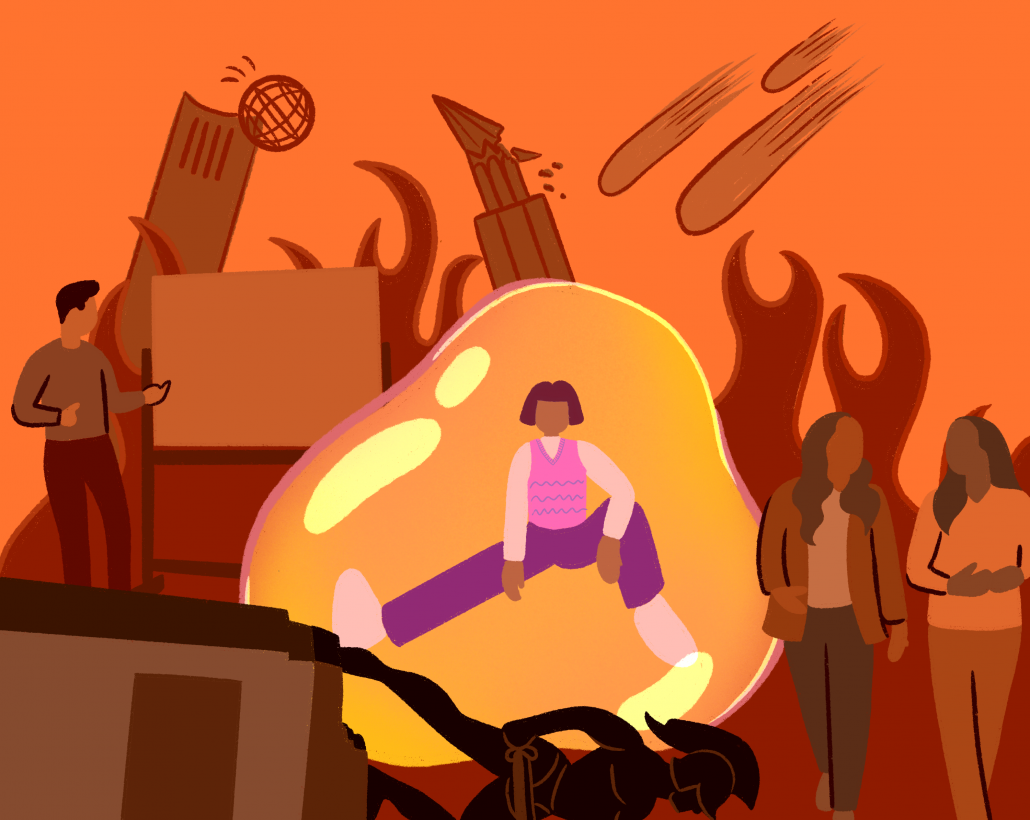The world was built by and for extroverts — and now it’s falling apart
It’s 2021 — we’ve all taken the Myers-Briggs personality test. Those mysterious little initials can be found in many peoples’ Twitter bios, right next to the peace sign emoji and their graduation year.
The Myers-Briggs test is a questionnaire that allegedly defines the taker’s personality type, strengths and weaknesses. It’s the psychological equivalent of zodiac signs, in all effect.
The first letters of all 16 personality types are either I or E, representing introversion or extroversion, respectively. These terms are surely familiar enough, but one is so often mischaracterized, that its group has been essentially left out — from leadership opportunities, educational development, rebuilding efforts, the whole enchilada.
This all stems from a fundamental misunderstanding of what being an introvert exactly means.
If we were to leave our scientific understanding of introversion and extroversion to the wild wolves of the internet, Carl Jung would roll over in his grave and die again. Introversion is not the tendency to hate people or the complete lack of social skills — it’s simply a higher level of baseline arousal, meaning it takes less for them to feel stimulated. Where an extrovert may need a high-intensity sport, the introvert may need only a stroll around the block.
So extroverts are less “get high on the spice of life for the sake of adventure,” and more “if we don’t keep it moving, we will die of boredom right here on this couch.”
Introverts make up an estimated 50% of the human population, but you wouldn’t know that by just looking at our social expectations alone. Open-concept design plans have replaced cubicles with privacy walls; desks in elementary classrooms get clustered together to encourage collaboration and group work.
Group work or “collaborative learning” makes it easy for less motivated students to ride the coattails of their harder-working colleagues, all while ignoring the basic strengths and preferences of — likely — half the class.
Michael Godsey, a high school English teacher, visited a public high school in California in 2015. He wrote of the experience: “All but four of the 26 teachers I witnessed had their students arranged in groups or with partners. Such formations aren’t necessarily irreconcilable with the needs of introverts, but these arrangements can inherently enable noisy, distracting conditions that make learning particularly difficult for certain students.”
An overemphasis on class participation plays a role, too, in isolating quiet students from their outspoken peers. Introverts take more time to develop their ideas and organize their thoughts, but when class discussion is worth up to 35% of the overall grade, there’s no time for careful consideration — now the focus is on impressing the professor with an improvised public speech.
Collaborative learning and forced debates can be pains in the ass for anybody who respects their education, but they can also create a blackhole through which all individual creativity is sucked into and destroyed.
Susan Cain, author of the acclaimed book “Quiet: The Power of Introverts in a World That Can’t Stop Talking,” supports this: “When you’re working in a group, it’s hard to know what you truly think. We’re such social animals that we instinctively mimic others’ opinions … And, when we do disagree consciously, we pay a psychic price … people who dissent from group wisdom show heightened activation in the amygdala, a small organ in the brain associated with the sting of social rejection.”
If roughly half of the student body isn’t benefiting from the extroversion bias, and if neuroscience has proven its baleful side-effects, why are we participating in it?
There is a direct pipeline between how introverted students are treated in the classroom and their career mobility in the workforce. According to a University of Toronto Scarborough study, extroverts, specifically extroverted men, are far more likely to advance in their careers, not because they’re geniuses, but because “they’re adept at persuading people in situations like job interviews and negotiations.”
Interestingly, further research renders this practice counterproductive. Hiring the most outspoken person in the room hardly, if ever, results in an efficient work environment. Introverted people make for more favorable leaders. Since they don’t feel that intense need for external validation or the heat of the spotlight, introverted managers, for example, are more likely to share in their team’s successes as well as their downfalls.
Since introverts process information more slowly, their conversations are focused and their responses measured. They’re more likely to lead with compassion, often getting to know their colleagues more deeply than, say, the schmoozy business major always roleplaying as the Devil’s advocate.
Anytime we find ourselves in a situation where half of the population is subject to ignorance or — worse yet — ridicule, thunderous revolution soon follows. Though in this case, admittedly, the revolution may be more quiet.
There is great value in solitude and independence. The abolishment of all things collaborative will never come, so there’s no need to swing the pendulum so hard in the other direction. Ultimately, we can never forget that we are social creatures with a deeply complex and turbulent internal life — a life we frequently abandon, maybe for fear of what lies in wait there.


